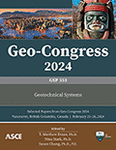Effects of Jointed Plain Concrete Pavement’s Design Inputs on Performance Indicators
Publication: Geo-Congress 2024
ABSTRACT
The most used rigid pavement throughout the United States is jointed plain concrete pavement (JPCP), providing a service life of 30 years or more. JPCP is proven to be a cost-effective pavement system, providing long service life and other sustainability benefits. The structure of JPCP systems and other critical factors, such as material properties, traffic, and climate, impact the performance and serviceability of the JPCP. The analysis of impacts of all these design variables is necessary to understand the most critical factors affecting JPCP lifetime performance. The state-of-the-art pavement ME design (PMED) software evaluates the pavements’ performance through the international roughness index (IRI), joint faulting, and transverse cracking. This study focuses on performing a sensitivity analysis of the design inputs used in PMED software on the predicted performance of JPCP systems. Simulations were performed using the PMED software version 2.6.2.1 for various JPCP design inputs that include pavement structure, mechanical and thermal properties of paving concrete, climate, and traffic. Variables assessed are coefficient of thermal expansion (CTE), Portland cement concrete (PCC) slab thickness, slab width, slab length, friction loss, PCC shortwave absorptivity, PCC thermal conductivity, dowel diameter, PCC heat capacity, climate, and traffic. The data produced from the PMED software simulations is analyzed based on the JPCP performance indicators. Results on the IRI indicator analysis show CTE, PCC thickness, and climate to have the most impact. CTE, climate, and slab width hold the most impact on the joint faulting indicator. The transverse cracking indicator results present CTE, slab length, and friction loss exhibiting the most impact. It is evident from the sensitivity results that CTE of paving concrete holds the most influence among all three JPCP performance indicators.
Get full access to this article
View all available purchase options and get full access to this chapter.
REFERENCES
Cavalline, T. L., Tempest, B. Q., Blanchard, E. H., Medlin, C. D., and Chimmula, R. R. (2018a). Improved Data for Mechanistic-Empirical Pavement Design for Concrete Pavements. FHWA/North Carolina Department of Transportation, Raleigh, NC.
Cavalline, T. L., Tempest, B. Q., Blanchard, E. H., Medlin, C. D., and Chimmula, R. R. (2018b). Impact of Local Calibration Using Sustainable Materials for Rigid Pavement Analysis and Design. ASCE Journal of Transportation Engineering, Part B: Pavements, 144(4), https://doi.org/10.1061/JPEODX.0000073.
Ceylan, H., Kim, S., Gopalakrishnan, K., Schwartz, C. W., and Li, R. (2013). Sensitivity quantification of jointed plain concrete pavement mechanistic-empirical performance predictions. Construction and Building Materials, 43, 545–556. https://doi.org/10.1016/j.conbuildmat.2013.02.057.
Mai, D., Turochy, R. E., and Timm, D. H. (2014). Sensitivity of flexible pavement thickness to traffic factors in mechanistic-empirical pavement design. Journal of Transportation Engineering, 140(2). https://doi.org/10.1061/(asce)te.1943-5436.0000628.
McCarthy, L. M., Gudimettla, J. M., Crawford, G. L., Guercio, M. C., and Allen, D. (2015). Impacts of variability in coefficient of thermal expansion on predicted concrete pavement performance. Construction and Building Materials, 93, 711–719. https://doi.org/10.1016/j.conbuildmat.2015.04.058.
Mu, F., Vandenbossche, J. M., Gatti, K. A., and Sherwood, J. A. (2012). An evaluation of JPCP faulting and transverse cracking models of the mechanistic-empirical pavement design guide. Road Materials and Pavement Design, 13(1), 128–141. https://doi.org/10.1080/14680629.2011.644179.
Premkumar, L., and Vavrik, W. R. (2016). Enhancing pavement performance prediction models for the Illinois Tollway System. International Journal of Pavement Research and Technology, 9(1), 14–19. https://doi.org/10.1016/j.ijprt.2015.12.002.
Shafiee, M., Maadani, O., and Shirkhani, H. (2022). Evaluation of climate impacts on jointed plain concrete pavement structures. National Research Council Canada.
Simpson, A. L. (1994). Sensitivity analyses for selected pavement distresses. Strategic Highway Research Program, National Research Council.
Information & Authors
Information
Published In
History
Published online: Feb 22, 2024
ASCE Technical Topics:
- Climates
- Computer programming
- Computer software
- Computing in civil engineering
- Concrete pavements
- Design (by type)
- Engineering fundamentals
- Engineering mechanics
- Environmental engineering
- Highway and road design
- Infrastructure
- Material mechanics
- Material properties
- Materials engineering
- Pavement design
- Pavements
- Sight distances
- Slabs
- Structural engineering
- Structural members
- Structural systems
- Thermal properties
- Thermodynamics
- Transportation engineering
Authors
Metrics & Citations
Metrics
Citations
Download citation
If you have the appropriate software installed, you can download article citation data to the citation manager of your choice. Simply select your manager software from the list below and click Download.
